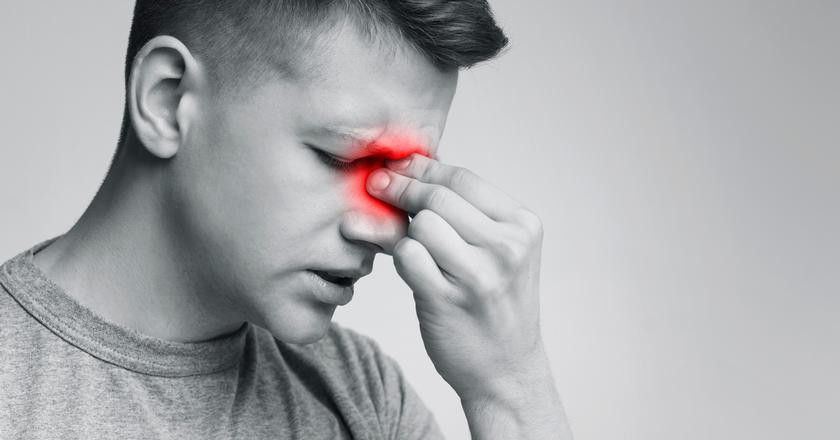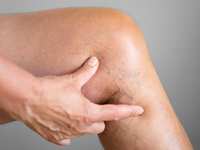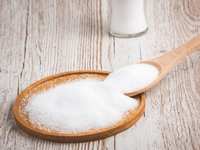What's the Fastest Way to Get Sinus Pressure Relief?

If you have an uncomfortable sensation of tightness or fullness in your face, particularly around the eyes, forehead and nose, you might be dealing with sinus pressure. It causes an ache that's dull, yet persistent. Maybe even more annoyingly, this discomfort can quickly intensify with simple movements or changes in position, throbbing as you bend over or after turning your head too fast.
Basically, sinus pressure is a true pain in the nose — one you want gone fast.
"We actually don't fully understand why we have sinuses," says Dr. Mas Takashima, an ENT doctor at Houston Methodist who specializes in treating nose and sinus issues. "You think that would be anatomy 101, but the sinuses remain somewhat of a mystery. Why are they there? Why are some people's sinuses large and other's small? Why are some people born without certain sinuses?"
Theories abound about the purpose of our sinuses — ranging from a way to help humidify air in the nasal passageways to acting as a resonance chamber for the voice or shock absorbers for the brain. But while their origin story comes with plenty of question marks, one thing is certain: The sinuses can cause us some serious grief.
Fortunately, Dr. Takashima is here to help when it comes to what to do for sinus pressure.
Why does sinus pressure happen?
"A person typically feels facial pressure and discomfort when there is swelling in or around the sinuses," says Dr. Takashima. "And this could be due to something going on inside a sinus or it could be the result of a sinus becoming blocked."
Since the sinuses are lined with many blood vessels and nerve fibers, this buildup of pressure can be felt as fairly noticeable pain.
The common causes of sinus pressure include:
- Upper respiratory infections, like the common cold
- Sinus infections
- Allergies
- Atmospheric pressure changes
All of these can more easily lead to sinus pressure if you have an underlying nasal or sinus issue, such as a deviated septum, polyps inside the nose or your sinus openings are very narrow.
"This is when even just a little bit of swelling from something like a bad cold, allergies or changes in atmospheric pressure — due to a cold or warm front — is enough to block off the sinuses and cause a problem," explains Dr. Takashima.
Dr. Takashima's analogy for how external pressures can affect the sinuses: a bag of chips swelling during air travel. If you've ever brought an unopened bag of chips on an airplane, you've seen how big the bag can expand when you're up in the air — then crumple back down once you land.
"It's the same situation in the sinuses," says Dr. Takashima. "The sinuses are pockets of air so if the external pressure increases and there's no good way for air to move in or out, the pocket swells. And this can feel painful."
The swelling and excess mucus production that occurs during a sinus infection or bout of bad allergies is painful as well.
How to relieve sinus pressure
What should you do when sinus pain strikes? Sometimes it can depend on the underlying cause of the swelling, but — more often than not — sinus pressure relief can be achieved at home with time and the following at-home remedies:
Sinus rinse
Whether the pressure is due to a sinus infection, allergies or something else, Dr. Takashima recommends starting with a saline rinse kit.
"The goal is to clean out the nose, your air filter," says Dr. Takashima. "Saline irrigation can help flush away whatever irritant is in there causing the swelling or mucus production."
You can do as many sinus rinses as you have time and supplies for — in other words, there's no way to overdo it. Just be sure you're using sterile water, such as distilled water, bottled water or water that's been boiled and allowed to cool to a safe temperature.
Keep your head elevated
As mentioned, sinus pain can go from a dull ache to serious throbbing with even the smallest movements.
"Any position change that puts your head below your heart increases blood flow to your face and head," explains Dr. Takashima. "This can lead to pulsations within the sinuses that can be really painful."
You can help mitigate this by limiting yourself to what are called dependent positions — ones that help promote proper blood flow and drainage.
"Keeping your head elevated above the level of your heart as much as possible is a really beneficial way to help reduce sinus pressure," says Dr. Takashima.
Warm compress
Which is better for alleviating pain: ice or heat? In the case of sinus pressure, specifically, Dr. Takashima recommends heat.
"A warm compress is helpful for relieving sinus pain since it can help lessen the pressure felt," adds Dr. Takashima.
An easy way to do this is to run a washcloth under hot water and apply the warm, damp towel to your face.
Drink plenty of water
"When you're dehydrated, the consistency of your mucus changes — becoming a lot thicker," says Dr. Takashima. "The thicker your mucus, the slower it will flow through your sinuses. This can lead to more blockage and pressure."
Try a decongestant
For sinus pressure accompanied by nasal congestion, nasal sprays can help.
"Especially if you have a really bad cold and you're really congested, a nasal decongestant spray can help open up the sinuses," says Dr. Takashima. "You might even take this opportunity to do a nasal rinse and really clear out the contaminants leading to problems in your nose."
A word of warning about nasal decongestant sprays, though: They're addictive, leading to rebound congestion if taken too long. Avoid using a nasal decongestant spray for more than three days.
Take an over-the-counter pain reliever
For occasional sinus pain and pressure, it's totally fine to look to over-the-counter medications for help. But in the aisle of options, what's the best medicine for relieving sinus pressure?
"Nonsteroidal anti-inflammatory drugs, NSAIDs, tend to work better for sinus pressure than acetaminophen-based painkillers," says Dr. Takashima. "NSAIDs help temporarily reduce some of the swelling that's causing discomfort."
Sinus massage
Many people prone to sinus pressure swear by sinus massages. While Dr. Takashima is somewhat skeptical of whether the practice truly helps, he points out that it won't cause any harm.
"Generally speaking, massaging increases blood flow to the area," says Dr. Takashima. "There's no published evidence supporting the effectiveness of massage for sinus pain relief, but, that being said, if it makes you feel better, keep doing it. It's not going to cause problems."
When to see a doctor about sinus pain
If you've tried the steps above but aren't getting enough sinus pressure relief, it might be time to see a doctor.
"A lot of the time, people are able to treat the issue themselves at home and don't need to come in to see me," says Dr. Takashima. "But if sinus pain is affecting your quality of life — disrupting your sleep or ability to concentrate — then absolutely get it checked out. This is when identifying the cause of sinus pressure is so important."
For instance, bad allergies can be hard to distinguish from a sinus infection based on symptoms alone, even for a specialist like Dr. Takashima.
"That's why we use tools that help us see inside the nose to more clearly understand what's going on," says Dr. Takashima, "I can use my scope to look for pus coming out of the sinuses, which indicates the cause of the pressure is a sinus infection."
A CAT scan can be used to image the sinuses. Dr. Takashima explains that the sinuses will look clear on this scan if allergies are the cause, whereas the presence of fluid and bubbles would indicate sinusitis.
"We need to get the right diagnosis to help alleviate sinus pressure long-term," says Dr. Takashima. "If the pressure is due to recurring sinus infections, there are certain things we can do to prevent them. If sinus pain is related to allergies, we can do allergy testing and focus on allergen avoidance or even allergy shots."
Facial pain around the sinuses can sometimes be due to something else entirely. If the pain is new and abrupt, getting worse or associated with unusual symptoms like vision changes, don't ignore it.
"We have to consider whether facial pressure is secondary to a sinus issue or due to another cause, such as muscular skeletal pain, vascular pain, neurologic pain or migraines," adds Dr. Takashima. "Part of our evaluation is ruling out the other causes of facial pain — of which there are several — so we can make sure we're addressing the underlying problem."

















